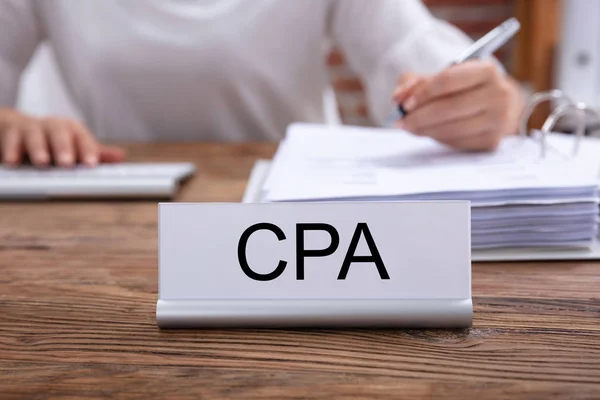A Comprehensive Guide on Becoming a Certified Public Accountant (CPA)
Are you considering a career as a Certified Public Accountant (CPA)? If so, you’re about to embark on a rewarding and challenging journey that can significantly boost your professional opportunities. This article will walk you through the steps involved in becoming a CPA, shedding light on the rigorous certification process and the wide range of career paths available once you’re certified. By the end, you’ll have a clearer understanding of why pursuing this designation is a smart move for anyone looking to excel in the accounting field. Keep reading to discover the benefits of becoming a CPA and how it can shape your future in the world of finance!

What is a CPA?
A Certified Public Accountant (CPA) is a highly skilled professional in the field of accounting, having successfully passed a rigorous exam while also fulfilling stringent educational and experience requirements. CPAs are licensed by the state and must adhere to strict ethical guidelines, which reflect their responsibility in managing vital financial tasks such as auditing, tax preparation, and financial advising. By ensuring both accuracy and compliance with legal standards, CPAs play a crucial role in maintaining the integrity of financial reporting.
In contrast to regular accountants, CPAs possess a certification that distinguishes them, highlighting their advanced expertise and unwavering dedication to ethical practices. This certification not only sets them apart but also underscores their commitment to delivering trustworthy financial services.

How to Become a CPA
To become a CPA, candidates must meet educational, experiential, and exam-related requirements. Here’s a step-by-step guide:
Step 1: Meet Education Requirements
To be eligible for the CPA exam, candidates must first earn a bachelor’s degree in accounting or a closely related field. However, it’s important to note that many states go beyond this basic requirement by mandating 150 semester hours of coursework, which exceeds the standard credits required for a typical bachelor’s degree. Because of this, aspiring CPAs often find themselves pursuing additional classes or even a master’s degree to meet the required credit hours. This extra coursework helps ensure that candidates are well-prepared for the comprehensive knowledge expected of a CPA.
Step 2: Gain Relevant Experience
Before obtaining your CPA license, you are required to complete 1-2 years of relevant work experience, usually under the supervision of a licensed CPA. This hands-on experience is crucial as it allows aspiring CPAs to apply the concepts they’ve learned in a real-world setting, helping to develop practical accounting skills that are essential for success in the profession. Working alongside an experienced CPA provides invaluable insights into the complexities of accounting tasks such as financial reporting, audits, and tax preparation, further preparing candidates for the challenges they will face once fully licensed.
Step 3: Pass the CPA Exam
The CPA exam is a comprehensive, multi-part test that evaluates a candidate’s knowledge across various areas of accounting. Known for its difficulty, this exam is designed to ensure that only those with a strong understanding of accounting principles and practices can earn the CPA designation. Passing the CPA exam is a critical milestone in the certification process, as it demonstrates the candidate’s readiness to handle complex financial responsibilities and comply with professional standards. Successfully completing this exam is essential for advancing toward licensure as a Certified Public Accountant.
Step 4: Apply for Licensure
Once you have successfully passed the CPA exam, the next step is to apply for your CPA license through your state’s Board of Accountancy. It’s important to note that each state has its own specific licensing requirements, which may include additional education, experience, or even ethics exams. Therefore, it’s essential to carefully review the regulations in your state to ensure you meet all the criteria for licensure. Being aware of these requirements will help you smoothly navigate the final steps toward becoming a fully licensed CPA.
Step 5: Complete Continuing Education
Once you obtain your CPA license, maintaining it requires ongoing professional development. To do so, you’ll need to complete continuing education courses on a regular basis. This requirement ensures that licensed CPAs remain up-to-date with the latest accounting standards, regulations, and industry practices. Most states mandate a specific number of continuing education hours per year to keep the license active, which not only reinforces your expertise but also helps you stay competitive in the ever-evolving field of accounting.
CPA Exam Overview
The CPA exam consists of four parts:
- Auditing and Attestation (AUD): Focuses on auditing processes and ethics.
- Business Environment and Concepts (BEC): Covers business operations, financial management, and IT.
- Financial Accounting and Reporting (FAR): Deals with financial accounting standards.
- Regulation (REG): Addresses tax laws, business law, and ethics.
You must pass all four sections within 18 months to earn your CPA certification.
How to Get a CPA License
To obtain a CPA license, you need to meet the following criteria:
State-Specific Requirements
Each state in the U.S. has its own unique requirements for obtaining a CPA license, which may go beyond simply passing the CPA exam. These requirements can include additional educational qualifications, specific types of work experience, and even different ethics exams or background checks. Therefore, it is crucial to check with your state’s Board of Accountancy for detailed and specific licensing rules and regulations. By doing so, you can ensure that you fulfill all necessary criteria and successfully navigate the path to becoming a licensed CPA in your state.
Continuing Education
Maintaining your CPA license involves a commitment to ongoing education, which is essential for staying current in the ever-evolving field of accounting. Most states require CPAs to complete approximately 40 hours of continuing education each year. This requirement helps ensure that accounting professionals remain informed about new laws, regulations, and industry practices that may impact their work. By engaging in continuing education, CPAs not only enhance their knowledge and skills but also reinforce their commitment to providing accurate and compliant financial services to clients and employers. This proactive approach to learning ultimately contributes to the overall integrity of the profession.
Career Opportunities for CPAs
As a CPA, you’ll have access to a wide range of career opportunities:

Public Accounting
In public accounting, CPAs provide services like auditing, tax preparation, and consulting to various clients across different industries.
Corporate Accounting
In corporate accounting, CPAs manage a company’s financial records, handle budgeting, and perform internal audits to ensure financial health and regulatory compliance.
Government and Non-Profit Roles
CPAs in government and non-profits help manage financial operations, ensuring transparency and proper use of resources.
The Differences Between CPAs and Non-CPA Accountants

A CPA is a certified professional with rigorous education, examination, and experience qualifications. Non-CPA accountants may not have passed the CPA exam or met the necessary requirements for certification.
Legal and Professional Distinctions
CPAs enjoy legal recognition that grants them the authority to perform specific tasks that non-CPA accountants are not permitted to undertake. For instance, CPAs are uniquely qualified to conduct audits of public companies, a responsibility that requires a deep understanding of regulatory standards and financial reporting. Additionally, they are authorized to represent clients before the Internal Revenue Service (IRS) in matters such as tax disputes or audits. This legal standing not only enhances their professional credibility but also underscores the rigorous training and ethical standards that CPAs must uphold, setting them apart in the accounting field.
Key Responsibilities of a Certified Public Accountant (CPA)
Auditing
CPAs handle both internal and external audits, ensuring financial statements are accurate and comply with regulations.
Tax Preparation and Planning
As tax experts, CPAs prepare tax returns and offer strategic tax planning services to minimize liabilities.
Financial Consulting
CPAs provide financial advice on investments, estate planning, and risk management, helping clients make informed decisions.
Forensic Accounting
CPAs investigate financial discrepancies and fraud, often providing expert testimony in legal cases.
Management Accounting
In management accounting, CPAs analyze financial data to improve business efficiency and profitability.
How Much Does a CPA Earn?
Salaries for CPAs can vary widely. Entry-level CPAs typically earn between €45,000 and €65,000 per year, with experienced CPAs earning between €70,000 and €100,000 annually. Senior roles and specialized positions can exceed €120,000 per year.
Benefits of Becoming a Certified Public Accountant
- Job Security: The demand for qualified CPAs remains consistently high across various industries, which contributes to a strong sense of job security. As businesses and organizations increasingly seek financial expertise to navigate complex regulations and ensure compliance, the need for skilled accounting professionals continues to grow.
- Career Opportunities: CPAs have the advantage of a diverse range of career opportunities available to them. They can work in public accounting, providing essential services to clients across different sectors, or pursue positions in corporate finance, where they manage financial operations within organizations. Additionally, CPAs can find fulfilling roles in government and non-profit sectors, expanding their career horizons even further.
- Increased Earning Potential: One of the significant benefits of becoming a CPA is the potential for higher earning power. Generally, CPAs earn salaries that are substantially higher than those of non-certified accountants. This increased earning potential reflects the advanced knowledge, skills, and expertise that come with obtaining the CPA designation.
- Job Satisfaction: Many CPAs report high levels of job satisfaction, largely due to the problem-solving nature of their work and the positive impact they have on their clients’ financial health. Engaging in challenging tasks that require critical thinking and analytical skills often leads to a rewarding career experience, making the CPA profession both fulfilling and impactful.
FAQs
1. Is a CPA or CFA Better?
It depends on your career goals. A CPA is ideal for accounting and auditing roles, while a CFA is more suited for investment management and financial analysis.
2. Is a CPA Useful for Finance Roles?
Yes, a CPA is highly valuable for finance roles, especially in areas like financial reporting, tax planning, and auditing.
3. Is CA or CPA Better?
Both are prestigious accounting qualifications. A CA (Chartered Accountant) is often more recognized internationally, while a CPA is highly regarded in the U.S. and beyond.
4. Where Do CPAs Earn the Most Money?
CPAs earn the highest salaries in industries like finance, consulting, and corporate accounting. Specialized fields such as forensic accounting and executive roles also offer higher pay.
5. Is Becoming a CPA Worth It?
Absolutely. CPAs earn about 25% more than non-certified accountants and can quickly advance to senior-level roles, making it a rewarding career investment.


